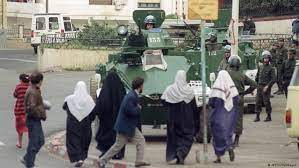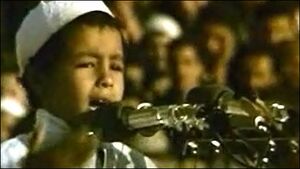Salamati Civil War
The Salamati Civil War was a conflict opposing the Salamati government, islamist groups and Ankur independentists.
Context
The end of Kharrabi's socialist state
Salamat was an authoritarian state led by Jalil Al Kharrabi, which imposed himself to power on May 16 1977. In the late 80s however, his authority was weakening and the stability of the country dwindling ; the 1987-1991 Salamati famine, the lack of job and housing opportunities, the lack of political freedom, and international embargoes against the country weakened the country's economy (GDP decreased from 47.2 billion in 1985 to 40.7 billion in 1988) and the famine damaged infrastructures and prevented basic services (electricity, water supply, waste management) from functioning properly. At the same time, decreases in the oil barrel's price and cotton price per ton (respectively 25% and 34% of the country's budget in 1986) led the citizens to suffer from inflation, which would impact the country for over 15 years, and from external debts after massive loans granted from Riamo in February, May and October 1986. (The IMF would erase most of Salamat's debt in 1997).
Consequently, Salamatis grew angrier about their government, marked by harshness and political inertia, as well as a provocative behaviour diplomatically which had a negative strain on the Salamatis image, especially those living abroad (eg. Salamati citizens discrimination in Riamo during the eighties). Youth unemployment (15% in 1980, 36% in 1985, 60% in 1990) became a fuel for popular protests, which became weekly by the spring of 1990. Kharrabi opened up to the rest of the world the same year, but it wasn't sufficient, as the problems remained and the youth grew more and more radicalized to islamist groups proning "jihad" against the "infidel" government of Salamat and the killing of the "apostate" Jalil Al Kharrabi, who "defiled Islam before the rest of the world".
Kharrabi's demise and following political chaos
The January reforms of Kharrabi were imposed too late and he was deposed 2 weeks after by the Salamati Armed Forces, which also grew disobedient of Kharrabi, and which became the ruling political apparatus from now on. As an effort to appease tensions, political parties were legalized in October 1992 by Mohammed Jandubi, the army-appointed president of Salamat. Jandubi was assisted by Malik Khayri, the army-appointed prime minister (which will become president after the former's resignation) and a group of army officers named "The Group of 5" (Abdellah Zerki, Said Charef, Mohammed Saadi, Larbi Sahibi and Taha Salah), which would take most of the decisions of the government until 1999 and it's disappearance, following most of the officers retirement or death.
However, the decision of legalizing parties just made more visible, with more and more contestations and protests organized every day in the capital, Dar Al Hamma, the biggest organized by islamists on November 13 1992, after the Friday Jumu'ah prayer, with over 80,000 protesters marching, chanting anti-government and anti-army slogans, as well as Quranic verses, and praying in the streets of the capital, before ending their protests at sunset, after a speech from Abdulbaqi Rayraoui's son praying for the Salamati government's destruction and the establishment of a Sharia-ruled state (His father, as well as his associates from the Islamic Party, Mohammed Si Saleh and Abdulrahman Al Hammadi, were imprisoned for agitation and inciting to overthrow the state back in 1991.)
The Salamati Local Elections were held on December 5 and December 12 1992, and were marked by support for the Islamic Party in a majority of communes, approaching a rate of 70% nationwide. The government, furious, could not let Salamat become an Islamic State, and a letter from Abdellah Zerki to Mohammed Jandubi, written December 15 1992, expressed this sentiment.
The Islamic Party, very happy about it's victory in elections, started applicating its program ; the motto on the People's Communal Assemblies (PCA) were changed to "Islamic city of ..." ; liquor stores were banned ; Hijab was forced upon women ; video stores banned and any opposition or suspicion of opposition could lead to public humiliation and even death (eg. Abdelhaq Sahrawi's death in Sidi Ghalmat on December 29 1992).
Around early January 1993, the Salamati Armed Forces started combing their ranks, removing any potential islamist sympathiser ; by the 20 of the month, the operation was finished, and the most radicalized were court-martialed and executed. An estimated 7 000 soldiers were purged, including 480 which were executed.
The cancelling of elections and escalation of tensions
In a letter written by Said Charef to Sahibi and Salah on January 22 1993, Charef demanded "the cancellation of all electoral processes" until further notice, "including the presidential elections scheduled to take place February 13 and February 20 1993 and the legislative elections of May 22-29 1993 ", to avoid the election of the Islamic Party and its legislative dominance, turning Salamat into a "fundamentalist Islamist state".
The cancellation of the elections was announced shortly before the planned 1st round, on February 9, by the president. A lot of protesters, notably islamists, marched in the streets to reject this cancellation. As a result, Jama'at Alinqadh Al Islami fi Salamat, an Islamist armed group, declared jihad on the Salamati government on February 15, followed by numerous groups in the following days and weeks. Journalists, families of soldiers or government members were threatened and the first terrorist attack occurred on March 2 with the Air Thrismari Flight 133 incident, when a Tupolev 154 was disintegrated in a blast while landing at Dar Al Hamma International Airport.
Civil war
Start of the civil war (1993-1995)
The date of April 10 1993 is the one retained as the start of the civil war. This day, Mohammed Jandubi, then president, made a televised speech, which condemned the islamists actions and declared a "war for the preservation of the country" against islamist militias which were starting to strike chaos in the Salamati society, notably with the murders of journalists, which often condemned islamists and were secularists. The next day, April 11, saw the declaration of the emergency state, which would be lifted only in 2006. Over the next weeks, the islamists were striking harder and now often, every week, at least 4 journalists were assassinated. Adding to the murders were the attacks on military barracks ; in the morning of June 24 1993, 6 soldiers were killed by a pipe bomb which was hidden in a plastic bag. Jandubi eventually stepped out of power on April 24 1993, having failed to pacify the then-unstable Salamat (although some sources point out that the DIS forced him to step down), and Malik Khayri, which was the prime minister, became president.
The first massacres started in August 1993, first near Sidi Ghalmat, in hills north of the city. On August 9, the village of Bouzageur was attacked (22 dead), then on August 12, the village of Abou Bouzid (17 dead). The massacre chain ended on August 19 with the massacre of Asell which claimed the lives of 38 villagers. Asell being located just east of military barracks, some opponents to the regime argued that the government (and the army) were responsible of the massacres, due to its passivity.
In reaction to all of these attacks, a curfew was imposed in late August to prevent any subversive actions during the night. In reaction to the curfew, islamists exploded a car laden on Majid Muhammad Boulevard on the morning of September 20 1993. 32 lives were claimed by the attack, and the AIG, an hardline islamist group, was suspected of the attack. However, none of these groups claimed the attack. The armed wing of the Islamic Party, the AIM, started targeting political figures, with the murder of Dalil Boubakar (1932-1993), old minister of finances, on October 5, and the attempted murder of the vice-president of the Salamati League of Journalism on October 8, both claimed by the AIM. Projects of bombings in Douara were foiled on the 14 of the month.
According to an AIM defector, in late October 1993, most of the fighting islamist groups discussed of the possibility of an "United Islamic Front" against the government of Salamat. However ideological differences between those groups prevented the union.
Terrorists also started attacking industrial assets. On December 11, an oil refinery near Al Ajmayl was attacked by AIG militants, in a way to paralyse the Salamati economy, and to earn money. Oil refineries, factories and mines were attacked throughout the year 1994, with a peak in August, when the fracture between the AIG and AIM occurred.
In April 1994, another opponent of the regime, although not islamist, appeared ; the Ankur Autodetermination Movement, which strides for the independence of Ankur, which they deemed, was "negliged by the central government in Dar Al Hamma.
The Salamati regime had to fight on a supplementary front, which was straining their capacities, both economic and military. The Studio of Houari Ben Samir terrorist attack further motivated the Salamati government to multiply their efforts in their struggle against terrorism, but the Salamati governement was on the brink of collapse due to this strain and had to deport suspected terrorists to former Kharrabist political camps. This went on for about three months, until the first diplomatic supports in favor of Salamat appeared as an aftermath of the Vrede Airlines Flight 1080 Incident on July 12.
The tension on the government further decreased in late August when the AIM, the armed branch of the Islamic Party, announced that they'll scale down their actions (due to the death of their leader Jassim Al Mekki on August 26, the AIM never recovered and ceased any activity by 1999). This angered the AIG, which, while having ideological differences (AIM was a Muslim Brotherhood group, AIG a radical salafist one), they depended on eachother to carry out their actions. This led to a great infighting between the AIG and the AIM, during fall 1994 and winter 1995, resulting in hundreds of deaths, and fatwas excommunicating eachother's members from Islam.
At the same time, the DIS created an anti-terrorist group called "The Guards of the Revolution" (TGR), which, while fighting islamists, butchered civilians which were suspected to be islamist sympathisers. But due to leadership issues, the group decayed before spring 1995.
The end of 1994 will see an attack which was unprecedented ; on December 10, a car laden exploded on Independence Square, Dar Al Hamma, with the goal of killing Malik Khayri. The attack was successful, and Khayri died 6 days later. The Group of 5, puzzled, had to appeal to an interim president, Amine Benbahlil.
1994 also saw the first attacks against tourists, streghtening support for the Salamati government worldwide, but some intelligence agencies were suspicious of these attacks and thought that the Salamati Armed Forces were behind.

